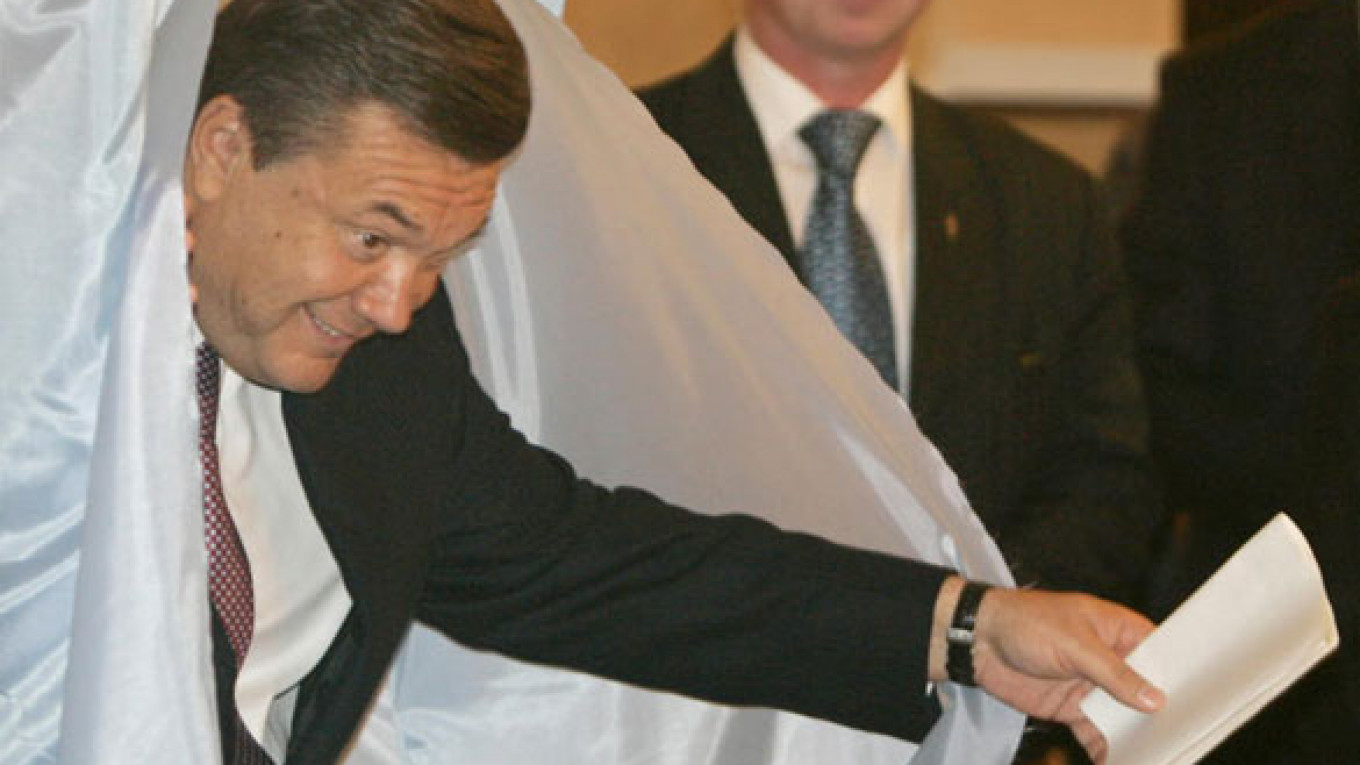Former German Chancellor Konrad Adenauer once said, "In view of the fact that God limited the intelligence of man, it seems unfair that He did not also limit his stupidity." Every one of Ukrainian President Viktor Yanukovych's recent actions provides living proof of this statement.
The Yanukovych administration is marked by two main features. First, Yanukovych is essentially a small-time criminal, and such people have a unique profile. They are typically rather dull, always looking for an opportunity to steal and incapable of anticipating the long-term consequences of their actions.
Second, Ukraine is actually ruled by Yanukovych's eldest son and his friends — all filthy rich. Since coming to power, Yanukovych has fired all of his original associates and alienated his initial sponsors, such as oligarchs Rinat Akhmetov and Dmytro Firtash.
That is why it would be pointless to look for strategic goals in the actions of the Ukrainian authorities. Instead, every move is motivated by the simplistic thinking of a small-time criminal and a group of overly confident and spoiled youth who believe, for example, that a car's gas pedal is for real men and the brake is for sissies.
Why did the authorities disperse the first group of protesters back in November? There is no logical explanation for it, except perhaps pure political incompetence.
The Yanukovych regime has dispatched hired thugs to beat everyone they encounter, set cars on fire and generally terrorize the population so Ukrainians will be afraid to leave their homes and join anti-government street rallies.
Perhaps there is a rational explanation for this decision. Maybe thugs were given instructions to beat only opposition leaders, but with their inherent love of violence, they found it more satisfying to beat everyone who crossed their path. But the real explanation is probably that the thugs were not hired with any strategic goal in mind but simply to give leaders a way to take revenge against the protesters.
Of course, all of this does not guarantee victory for the revolution. After Yanukovych jailed the person he fears the most, former Ukrainian Prime Minister Yulia Tymoshenko, he set about creating a weak, corrupt and easily controlled opposition. The job of co-opting and taming the opposition is handled by Andrei Klyuyev, who was recently called back to head the presidential administration in order to conduct negotiations with the opposition.
It is no coincidence that the official leaders of the Ukrainian opposition — Arseny Yatsenyuk, Oleh Tyahnybok and Vitali Klitschko — have agreed to negotiate with Yanukovych at the very moment when the only realistic demand from the revolutionary opposition should be the president's ouster.
It is also no coincidence that Yatsenyuk, Tyahnybok and Klitschko have not called for Tymoshenko's release because she would be a strong political competitor for all of the opposition leaders. In reality, protests and street violence are the only thing that give legitimacy to the Ukrainian revolution.
Either way, if Yanukovych does not flee the country this year, he will lose the presidential election in 2015. He could easily face serious criminal charges because the decisions to let snipers shoot at protesters and thugs wreck Kiev cannot go unpunished. Nothing and nobody can help Yanukovych escape that fate, even if Interior Minister Vitaly Zakharchenko follows the example of his predecessor by committing suicide with two bullets to his head.
Yulia Latynina hosts a political talk show on Ekho Moskvy radio.
A Message from The Moscow Times:
Dear readers,
We are facing unprecedented challenges. Russia's Prosecutor General's Office has designated The Moscow Times as an "undesirable" organization, criminalizing our work and putting our staff at risk of prosecution. This follows our earlier unjust labeling as a "foreign agent."
These actions are direct attempts to silence independent journalism in Russia. The authorities claim our work "discredits the decisions of the Russian leadership." We see things differently: we strive to provide accurate, unbiased reporting on Russia.
We, the journalists of The Moscow Times, refuse to be silenced. But to continue our work, we need your help.
Your support, no matter how small, makes a world of difference. If you can, please support us monthly starting from just $2. It's quick to set up, and every contribution makes a significant impact.
By supporting The Moscow Times, you're defending open, independent journalism in the face of repression. Thank you for standing with us.
Remind me later.








